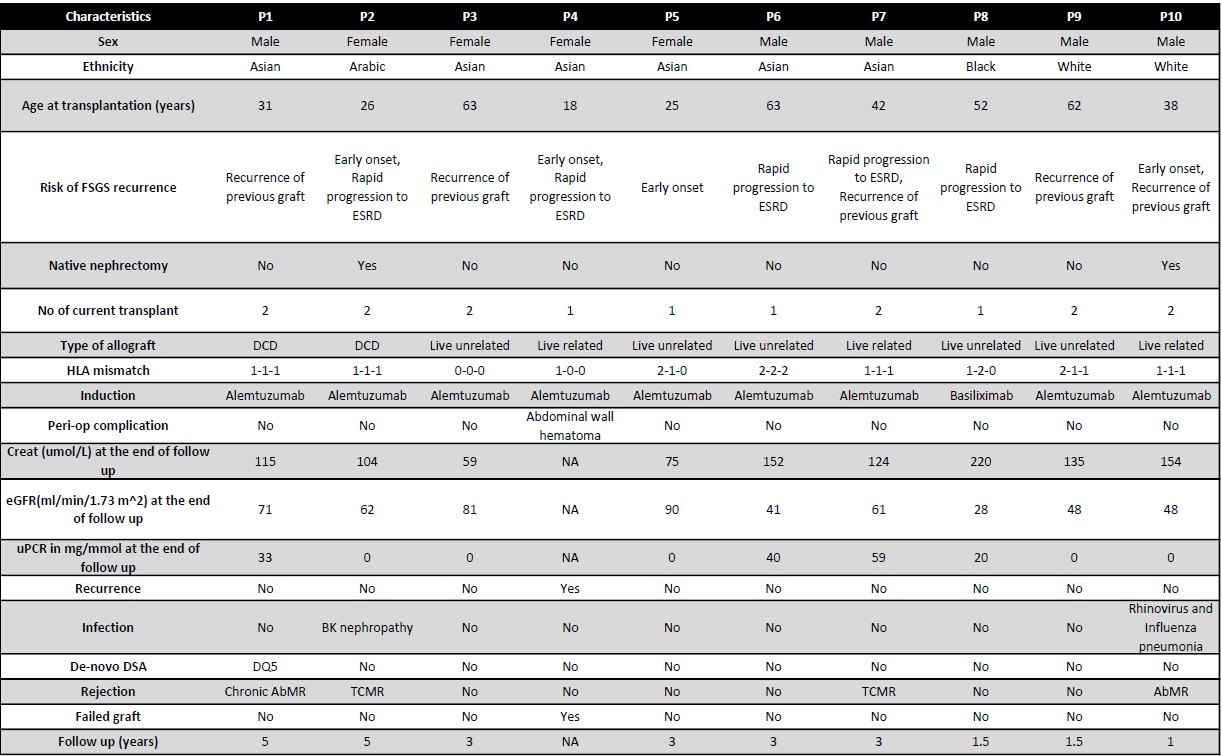Efficacy and Safety of Pre-Emptive Plasma Exchange and Rituximab in Prevention of Recurrent Focal Segmental Glomerulosclerosis after Kidney Transplantation in High-Risk Patients
Imperial College Kidney and Transplant Center, Hammersmith Hospital, London, United Kingdom
Meeting: 2020 American Transplant Congress
Abstract number: A-085
Keywords: Kidney transplantation, N/A, Plasmapheresis, Recurrence
Session Information
Session Name: Poster Session A: Kidney Immunosuppression: Novel Regimens and Drug Minimization
Session Type: Poster Session
Date: Saturday, May 30, 2020
Session Time: 3:15pm-4:00pm
 Presentation Time: 3:30pm-4:00pm
Presentation Time: 3:30pm-4:00pm
Location: Virtual
*Purpose: Focal segmental glomerulosclerosis (FSGS) is considered the leading cause of nephrotic syndrome in the adult population. Following kidney transplantation (KT), the recurrence rate of primary FSGS is approximately 20-50% with a 5-year graft survival rate of 52%. The rate increases to 80% in patients who experience FSGS recurrence in their first KT. We present the outcome of pre-emptive administration of plasma exchange (PLEX) and rituximab (RTX) in preventing FSGS recurrence in kidney transplantation.
*Methods: Ten adults with high-risk factors for FSGS recurrence post-KT treated pre-emptively with five sessions of PLEX before (if live donor) and after KT. All but two patients (P6 due to low baseline lymphocyte and P8 due to treated hepatitis B virus (HBV) infection) received a total of two grams of RTX administered 14 days apart following implantation. All, except one (P8), received alemtuzumab as induction. All patients received tacrolimus as maintenance immunosuppression with steroid-sparing as per our local protocol. Recurrence was suspected by the appearance of proteinuria with or without graft dysfunction and proven by biopsy showing extensive podocyte effacement on electron microscopy. Kidney biopsy was performed on all patients, except P5 due to hydronephrosis requiring stent insertion.
*Results: Median follow up was three years (range 1-5 years). 1 of 10 patients developed FSGS recurrence within one month of implantation resulting in graft failure in less than one year despite ongoing FSGS recurrence treatment. At the end of follow-up period, median creatinine was 124 (range 59-220) micromol/L, median eGFR 61 (range 28-90) mL/min/1.73m2, and median urine protein/creatinine ratio was 0 (range 0-59) mg/mmol. T-cell mediated rejection occurred in 2 of 10 patients requiring commencement of mycophenolate mofetil. One recipient developed acute donor-specific antibody (DSA) negative, antibody-mediated rejection (AbMR). Another developed de-novo DSA related chronic AbMR five-year post-KT.
*Conclusions: Pre-emptive PLEX and RTX protocol can effectively and safely reduce the risk of FSGS recurrence in high-risk KT recipients.
To cite this abstract in AMA style:
Christiadi D, Charif R, Kousios A, Loucaidou M. Efficacy and Safety of Pre-Emptive Plasma Exchange and Rituximab in Prevention of Recurrent Focal Segmental Glomerulosclerosis after Kidney Transplantation in High-Risk Patients [abstract]. Am J Transplant. 2020; 20 (suppl 3). https://atcmeetingabstracts.com/abstract/efficacy-and-safety-of-pre-emptive-plasma-exchange-and-rituximab-in-prevention-of-recurrent-focal-segmental-glomerulosclerosis-after-kidney-transplantation-in-high-risk-patients/. Accessed July 2, 2025.« Back to 2020 American Transplant Congress

